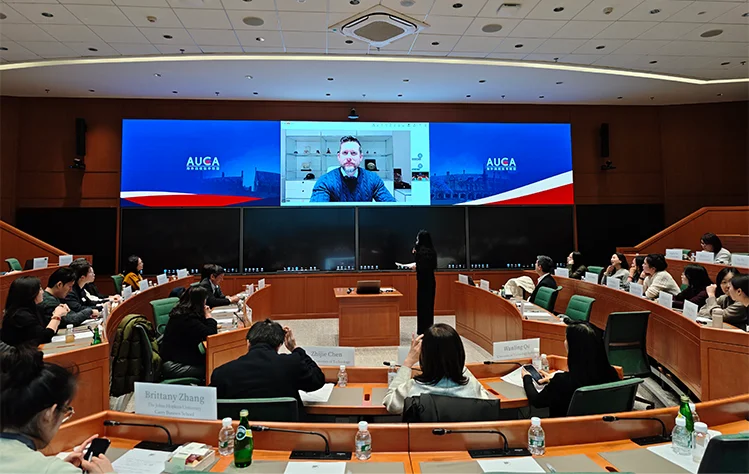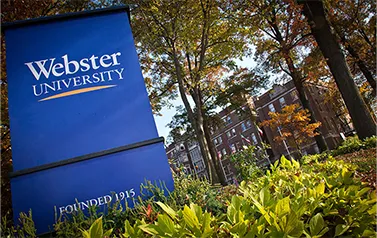Begin a Successful Career Path With Webster's BS in Psychology
The BS in Psychology is designed to provide the biological, cognitive, personality and social contexts for understanding the behavior of individuals throughout their lifespan.
Students who successfully complete the BS in Psychology will have the foundation, research skills and data analysis expertise to succeed in an MA/PhD Psychology graduate program (e.g., Clinical Psychology, Experimental Psychology, etc.).
Students graduating with a Bachelor of Science (BS) in Psychology will need to pursue a graduate degree before they are able to obtain professional licensure. Students are encouraged to check entrance requirements for any post-graduate programs prior to finishing their BS at Webster in the event that they need to take additional coursework.
Student Experience at Webster Leiden Campus
Transcript
[Instrumental music plays]
[Outside of the Webster Leiden Campus is shown with flags flying and the canal in front of it.]
Text on screen: Justin Buchanan, MA Psychology, Emphasis Counseling, From the U.S.
Justin Buchanan: My name is Justin. I'm from Connecticut, and I'm here at Webster University in Leiden studying Counseling Psychology or Psychology with an Emphasis in Counseling. Webster is a unique opportunity for students to come and live in a different culture while at the same time, able to maintain the original path, a career path they wanted to in the first place.
[Images of boats going up and down the canal, the water churning, bike riders, students and other people walking around and enjoying the weather, the sunlight gleaming off everything, etc. Imagery of the inside of the Leiden campus is shown from various angles. Buchanan sits, talks and walks with others inside outside in Leiden. He is in classroom settings with other classmates and professors, getting books off bookshelves, laughing, etc.]
Buchanan: Webster has the American academic accreditation, which is a big deal because while you're being taught by international people, you're able to work with other international students. Being around other cultures is really helpful because it lets me realize that it's important to think before you speak, to think about what other people are saying, to not make assumptions. Well, the things I'm learning, my social life and what I'm learning in school, really come together and are-co-current in the way that you shouldn't be making assumptions about your clients, as well, and you should be able to think about what you're saying and think about what they're saying, and taking their time. The program is organized really quite nicely where it builds you up so you start with obviously the intro of course is introduction counseling psychology and then it leads into kind of breaking down with the different types of therapy, different types of approaches are, and it gives you a really well-rounded view of everything psychology.
And the practicum, I've been able to work with actual clients and each week, we'll see about four or five clients, get to speak to a supervisor and figure out what we're going to do in the next step. If I could describe Webster in one word, I would say probably “opportunities.” You have these people from all over the world coming together and have this common ground here at Webster where we have opportunities to explore what we're interested in together. If I could pick a quote to use to represent this opportunity here, I would say, “Start where you are, use what you have and do what you can.”
[Instrumental music plays.]
Text on screen: Webster University logo, www.webster.nl
Program Details
Upon completion of the program, students will be able to:
- Describe the major concepts, theoretical perspectives, empirical findings and historical trends in psychology.
- Implement the use of scientific reasoning to interpret psychological phenomena and demonstrate the ability to to interpret, design and conduct basic psychological research using statistical analyses.
- Apply ethical standards to evaluate psychological science and practice and apply those standards to build and enhance interpersonal relationships locally and globally.
- Demonstrate effective writing, exhibit effective presentation skills and interact effectively with others.
- Discuss occupational pursuits available in a variety of settings given their psychological knowledge, skills and values.
- Detail the biological and genetic underpinnings of human behavior.
- Develop a research hypothesis based on the available literature in psychology and then collect, analyze and interpret data to address the question.
For information on the general requirements for a degree, see Baccalaureate Degree Requirements under the Academic Policies and Information section of the catalog.
- 64 required credit hours
- Applicable University Global Citizenship Program hours, with accommodations for the BS in Psychology
Electives
Global Citizenship Program for Psychology BS
For students completing the Psychology BS, MATH 1430 will satisfy both the requirements of the major and the GCP Quantitative Literacy requirement. In addition, WRIT 1010 will satisfy the requirements of the major and the GCP Written Communication skill requirement. BIOL 1010 and BIOL 1040 cannot be used to complete GCP requirements.
Special Requirements
- Courses completed with a grade below a C- do not count toward fulfilling the specific course requirements of the major.
- Within the required 64 credit hours, 30 credit hours must be at the 3000 level and above with at least 12 credit hours at the 4000 level.
- No more than 6 credit hours total obtained in senior thesis, practica, independent learning experiences, reading courses, directed study and assessment of prior learning may be applied toward the 64 credit hours required for a major. However, students may use any number of thesis, practica, independent learning experiences, etc. toward their overall bachelor degree requirements.
- Transfer students can apply up to 18 credit hours of approve PSYC coursework from other universities toward the psychology major.
- Student may substitute a higher-level composition, math or biology course for the non-psychology supporting core curriculum requirement. Students must confirm this substitution with the psychology department. Students may also transfer in these requirements.
The 64 credit hours required for the bachelor of science in psychology include the following:
Non-Psychology Core Requirements (13 hours):
- WRIT 1010 The Craft of College Writing (3 hours)
- MATH 1430 College Algebra (3 hours)
- BIOL 1010 Human Biology (4 hours)
- BIOL 1040 Human Genetics (3 hours)
Psychology Core Requirements (37 hours):
- PSYC 1100 Introduction to Psychology (3 hours)
- PSYC 1800 Careers in Psychology (1 hour)
- PSYC 2750 Introduction to Measurement and Statistics (3 hours)
- PSYC 2825 Introduction to Research Methods (3 hours)
- PSYC 2975 Sophomore Assessment (0 hours)
- PSYC 3025 Psychology and Ethics (2 hours)
- PSYC 4750 Advanced Statistics (3 hours)
- PSYC 4825 Senior Thesis (3 hours)
- PSYC 4925 Senior Capstone: History, Philosophy, and Systems of Psychology (3 hours)
- PSYC 4950 Senior Assessment (0 hour)
- Psychology electives (15 hours)
At least ONE course from EACH of the following content areas (15 hours):
Biological Perspectives
- PSYC 3850 Sensation and Perception (3 hours)
- PSYC 4300 Health Psychology (3 hours)
- PSYC 4550 Drug and Chemical Dependency (3 hours)
- PSYC 4650 Biopsychology (3 hours)
Clinical and Counseling Perspectives
- PSYC 3125 Abnormal Psychology (3 hours)
- PSYC 3775 Personality Theory (3 hours)
- PSYC 3900 Introduction to Counseling (3 hours)
- PSYC 4225 Introduction to the Helping Professions (3 hours)
Lifespan Development Perspectives
- PSYC 2200 Child Psychology (3 hours)
- PSYC 2250 Adolescent Psychology (3 hours)
- PSYC 2300 Lifespan Development (3 hours)
- PSYC 2950 Psychology of Adulthood and Aging (3 hours)
Learning and Cognitive Perspectives
- PSYC 3325 Applied Learning Theory (3 hours)
- PSYC 3350 Cognitive Psychology (3 hours)
- PSYC 3525 Memory (3 hours)
- PSYC 3725 Psychology of Judgment and Decision Making (3 hours)
Social and Cross-Cultural Perspectives
- PSYC 3475 International Psychology (3 hours)
- PSYC 3575 Industrial/Organizational Psychology (3 hours)
- PSYC 3600 Social Psychology (3 hours)
- PSYC 3625 Motivation and Emotion (3 hours)
Additional Information
This program is accredited by the Higher Learning Commission (HLC) in the United States. Webster has been accredited by the HLC for more than 95 years. This program is not Dutch-accredited and does not lead to a degree based on Dutch law, Wet op het Hoger Onderwijs (Law on Higher Education).

Become a Gorlok

Whether you’re seeking an undergraduate or graduate degree, we'll help you achieve academic excellence preparing you for future career successes. The first step is to fill out our application.
Highlights from the Netherlands

Internationalization of Higher Education: Practices and Challenges of ‘Going Global’
February 5, 2026

Webster University and Arcadia Abroad Partner to Expand Study Abroad Opportunities
January 21, 2026
Global Student Leadership Summit Empowers Students to Lead Across Borders
May 27, 2025
From May 18 to 23, a group of 23 undergraduate student leaders from across the Webster global network gathered at the...
